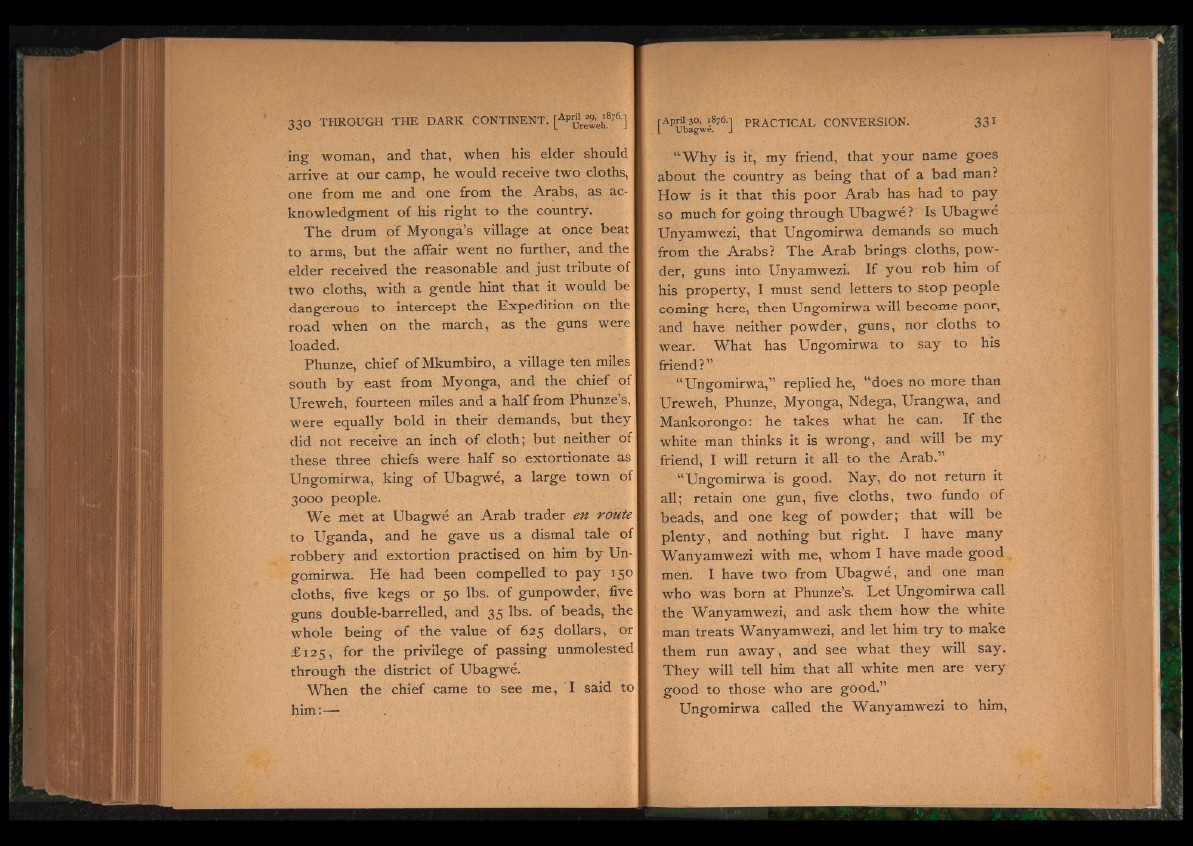
ing woman, and that, when . his elder should
arrive at our camp, he would receive two cloths,
one from me and one from the Arabs, as acknowledgment
o f his right to the country.
T h e drum o f Myonga’s village at once beat
to arms, but the affair went no further, and the
elder received the reasonable and just tribute of
two cloths, with a gentle hint that it would be
dangerous to intercept the Expedition on the
road when on the march, as the guns were
loaded.
Phunze, chief o f Mkumbiro, a village ten miles
south b y east from Myonga, and the chief of
Ureweh, fourteen miles and a half from Phunze’s,
were equally bold in their demands, but they
did not receive an inch o f cloth; but neither bf
these three chiefs were half so extortionate as
Ungomirwa, king o f Ubagwe, a large town of
3000 people.
W e met at Ubagwe an A rab trader en route
to Uganda, and he gave us a dismal tale of
robbery and extortion practised on him b y Ungomirwa.
He had been compelled to p a y 150
cloths, five k eg s or 50 lbs. o f gunpowder, five
guns double-barrelled, and 35 lbs. o f beads, the
whole being o f the value o f 625 dollars, or
£ 12 5 , for the privilege o f passing unmolested
through the district o f Ubagwe.
When the chief came to see me, I said to
him:—
[April 30, iS/fi-l PRACTICAL c o n v e r s io n . 331
L Ubagwe. J
“W h y is it, my friend, that yo u r name goe s
about the country as being that o f a bad man?
How is it that this poor Arab has had to p a y
so much for going through Ubagwe? Is Ubagwe
Unyamwezi, that Ungomirwa demands so much
from the Arabs? The Arab brings cloths, p ow der,
guns into Unyamwezi. I f yo u rob him of
his property, I must send letters to stop people
coming here, then Ungomirwa will become poor,
and have neither powder, guns, nor cloths to
wear. What has Ungomirwa to sa y to his
friend? ”
“ Ungomirwa,” replied he, “ does no more than
Ureweh, Phunze, Myonga, Ndega, Urangwa, and
Mankorongo: he takes what he can. I f the
white man thinks it is wrong, and will be my
friend, I will return it all to the Arab.”
“ Ungomirwa is good . Nay, do not return it
all; retain one gun, five cloths, two fundo o f
beads, and one k e g o f powder; that will be
plenty, and nothing but right. I have many
Wanyamwezi with me, whom I have made g o od
men. I have two from Ubagwe, and one man
who was born at Phunze’s. L e t Ungomirwa call
the Wanyamwezi, and ask them how the white
man treats Wanyamwezi, and let him try to make
them run aw a y , and see what th ey will. say.
T h e y will tell him that all white men are v e ry
go od to those who are good.”
Ungomirwa called the Wanyamwezi to him,